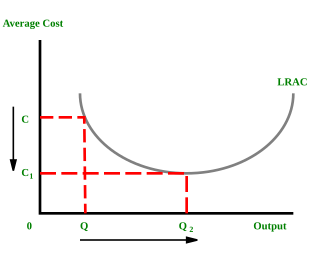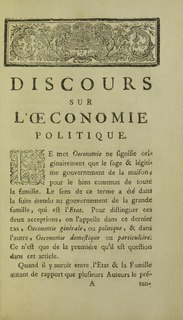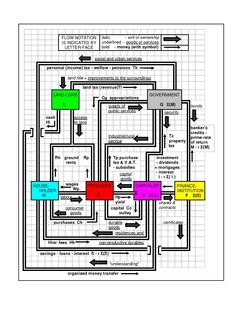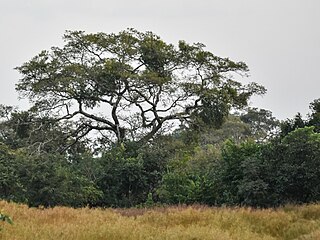A planned economy is a type of economic system where investment, production and the allocation of capital goods take place according to economy-wide economic plans and production plans. A planned economy may use centralized, decentralized, participatory or Soviet-type forms of economic planning. The level of centralization or decentralization in decision-making and participation depends on the specific type of planning mechanism employed.

Economics is the social science that studies how people interact with things of value; in particular, the production, distribution, and consumption of goods and services.

In microeconomics, economies of scale are the cost advantages that enterprises obtain due to their scale of operation, with cost per unit of output decreasing with increasing scale. At the basis of economies of scale there may be technical, statistical, organizational or related factors to the degree of market control.
Socialism is a political, social and economic philosophy encompassing a range of economic and social systems characterised by social ownership of the means of production and workers' self-management of enterprises. It includes the political theories and movements associated with such systems. Social ownership can be public, collective, cooperative or of equity. While no single definition encapsulates many types of socialism, social ownership is the one common element.

Political economy is the study of production and trade and their relations with law, custom and government; and with the distribution of national income and wealth. As a discipline, political economy originated in moral philosophy, in the 18th century, to explore the administration of states' wealth, with "political" signifying the Greek word polity and "economy" signifying the Greek word οἰκονομία. The earliest works of political economy are usually attributed to the British scholars Adam Smith, Thomas Malthus, and David Ricardo, although they were preceded by the work of the French physiocrats, such as François Quesnay (1694–1774) and Anne-Robert-Jacques Turgot (1727–1781).
A market economy is an economic system in which the decisions regarding investment, production and distribution are guided by the price signals created by the forces of supply and demand. The major characteristic of a market economy is the existence of factor markets that play a dominant role in the allocation of capital and the factors of production.
A mixed economy is variously defined as an economic system blending elements of a market economy with elements of a planned economy, free markets with state interventionism, or private enterprise with public enterprise. While there is no single definition of a mixed economy, one definition is about a mixture of markets with state interventionism, referring specifically to a capitalist market economy with strong regulatory oversight and extensive interventions into markets. Another is that of an active collaboration of capitalist and socialist visions. Yet another definition is apolitical in nature, strictly referring to an economy containing a mixture of private enterprise with public enterprise. Alternatively, a mixed economy can refer to a socialist economy that allows a substantial role for private enterprise and contracting within a dominant economic framework of public ownership. This can extend to a Soviet-type planned economy that has been reformed to incorporate a greater role for markets in the allocation of factors of production.

A developed country, industrialized country, more developed country (MDC), or more economically developed country (MEDC), is a sovereign state that has a developed economy and advanced technological infrastructure relative to other less industrialized nations. Most commonly, the criteria for evaluating the degree of economic development are gross domestic product (GDP), gross national product (GNP), the per capita income, level of industrialization, amount of widespread infrastructure and general standard of living. Which criteria are to be used and which countries can be classified as being developed are subjects of debate.

An economic system, or economic order, is a system of production, resource allocation and distribution of goods and services within a society or a given geographic area. It includes the combination of the various institutions, agencies, entities, decision-making processes and patterns of consumption that comprise the economic structure of a given community. As such, an economic system is a type of social system. The mode of production is a related concept. All economic systems have three basic questions to ask: what to produce, how to produce and in what quantities, and who receives the output of production.

The National Park of Upper Niger is a national park in Guinea that was gazetted in January 1997 with a core area of 554 km2 (214 sq mi). The park protects important tracts of forest and savannah, and is considered a conservation priority for West Africa as a whole.

Dabola is a in central Guinea. As of 2014 it had a population of 38,617 people. It grew around the railway line from Conakry to Kankan and is known for the Tinkisso Falls and for its important dam.

The Tinkisso River is a river in Guinea in west Africa. The river is sourced near Dabola in the Fouta Djallon mountain range, north of Mamou and snakes approximately north-east and then east across the plains of Guinea, until it runs into the River Niger at Siguiri. The river is approximately 400 kilometres in length.
An economy is an area of the production, distribution and trade, as well as consumption of goods and services by different agents. Understood in its broadest sense, 'The economy is defined as a social domain that emphasize the practices, discourses, and material expressions associated with the production, use, and management of resources'. A given economy is the result of a set of processes that involves its culture, values, education, technological evolution, history, social organization, political structure and legal systems, as well as its geography, natural resource endowment, and ecology, as main factors. These factors give context, content, and set the conditions and parameters in which an economy functions. In other words, the economic domain is a social domain of human practices and transactions. It does not stand alone.

Bissikrima is a town and sub-prefecture in the Faranah Region of Guinea in Dabola prefecture. As of 2014 it had a population of 28,840 people.

The Great Depression was a severe worldwide economic depression that took place mostly during the 1930s, beginning in the United States. The timing of the Great Depression varied across the world; in most countries, it started in 1929 and lasted until the late 1930s. It was the longest, deepest, and most widespread depression of the 20th century. The Great Depression is commonly used as an example of how intensely the global economy can decline.
Tinkisso Falls is a waterfall on the Tinkisso River located near Dabola in central Guinea. The falls are 70 m (230 ft) wide and 45 m (148 ft) high. The flow is highest during the rainy season, when the river flows close to ten times as strongly as in the dry season.












